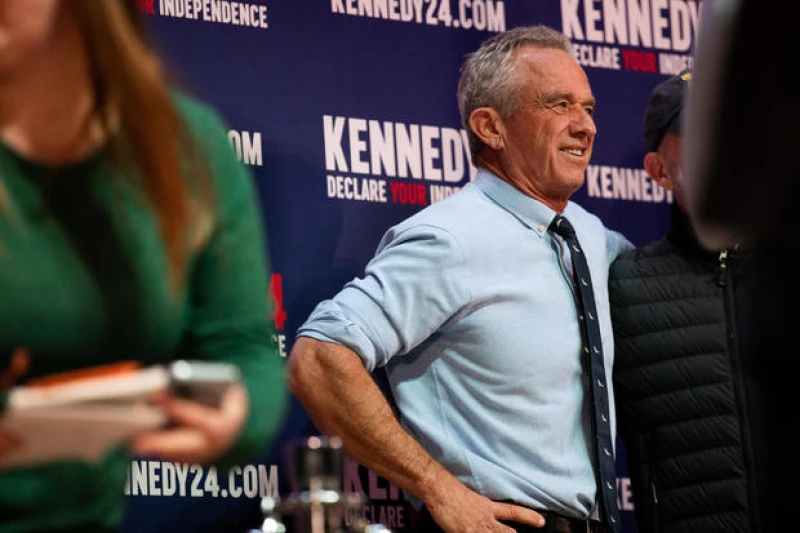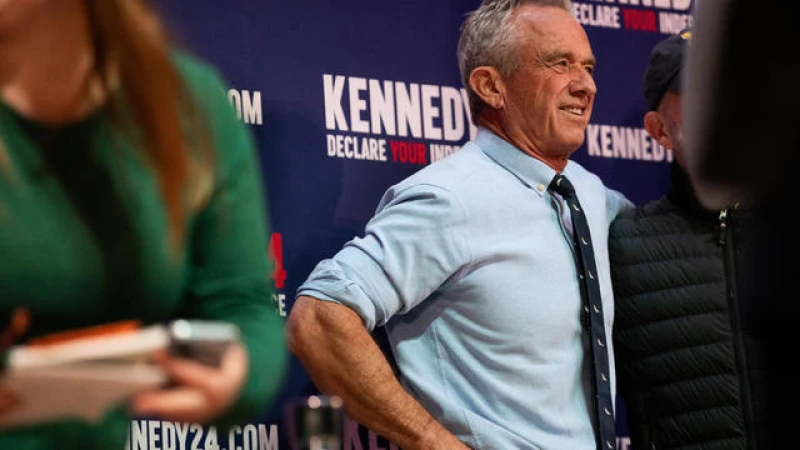With Robert F. Kennedy Jr. set to unveil his running mate on Tuesday, an unforeseen hiccup has emerged in Nevada, complicating the long-shot independent's path to gaining ballot access in the Silver State.
Kennedy's vice presidential pick comes as he needs a running mate to qualify for the ballot in multiple states. And despite the campaign's announcement earlier this month celebrating amassing 15,000 signatures in Nevada, which exceeds what's needed to get on the ballot in November, the campaign could be forced to start its signature collection from scratch in the state because it failed to name a running mate when it filed Kennedy's petition, according to documents filed by Kennedy.
Nevada's presidential candidate's guide states that independent candidate petitions must include both the presidential and vice presidential candidates' names on the petition in order to be valid, the Nevada secretary of state's office confirmed.
Documents requested from the Nevada office revealed that Kennedy only names himself on the petition, in violation of the rules and rendering the signatures collected in the state by his campaign void.
While facing this setback, the campaign moves further away from the goal of securing a spot on the ballot in all 50 states. However, there is still time to collect new signatures after Kennedy's running mate is named on Tuesday. The deadline to file the petition in Nevada is Aug. 7.
Kennedy's campaign has not yet submitted the signatures to the Nevada office.
The campaign has not responded to requests for comment.
Where is Kennedy on the ballot?
Utah is the only state that has confirmed Kennedy's presence on the ballot. The process for an independent candidate to get on the ballot varies in each state, posing a significant challenge for candidates not affiliated with a major party.
In New Hampshire, independent candidates must submit a Declaration of Intent during the filing period in June and then provide at least 3,000 signatures to the New Hampshire Secretary of State's office.
The Office of Elections in Hawaii has confirmed that Kennedy's supporters have gathered enough signatures to establish the "We The People" party, which can then nominate Kennedy as its presidential candidate on the ballot. Both New Hampshire and Hawaii also require the selection of a vice-presidential candidate before Kennedy can achieve ballot access in either state.
It remains uncertain if the signatures collected in other states, which mandate named running mates for independent presidential candidates to gain ballot access, will also be affected.
The super PAC supporting Kennedy, American Values 2024, has been actively involved in collecting signatures for ballot access. In December, the organization announced its intention to allocate between $10 million to $15 million towards this initiative. However, in February, the Democratic National Committee lodged a complaint with the Federal Election Commission. The complaint alleged that Kennedy's independent presidential campaign and the super PAC backing him, American Values 2024, were engaging in illegal collaboration regarding ballot access for Kennedy.
Following this complaint, American Values 2024 declared that they would cease signature collection on Kennedy's behalf. The organization stated that they had already met the signature requirements in Arizona, Michigan, Georgia, and South Carolina.
As a response to attempts by both Democrats and Republicans to undermine third-party campaigns, the PAC has shifted its focus.
"In light of the successful signature collection, we have halted further signature gathering in any additional states. We remain committed to challenging the [Democratic National Committee] or [Republican National Committee] in their efforts to impede on the constitutional rights of American voters who strongly support independent candidates being on the ballot," stated the PAC in a recent press release.
The Nevada secretary of state's office disclosed that on March 7 — just two days after Kennedy's announcement of reaching the signature threshold — a memo was circulated to all independent presidential candidates seeking ballot access. The memo explicitly outlined the requirements for filing with the office, mandating "a declaration of candidacy and a petition of candidacy, in which the person must also designate a nominee for Vice President."
As is tradition, the vice presidential candidate for the major parties is typically announced close to the nominating conventions. The Democratic National Convention is scheduled for Aug. 19-24, while the Republican National Convention will take place from July 15-18. It is during these conventions that the presidential and vice presidential nominees formally accept the nomination of their parties.








